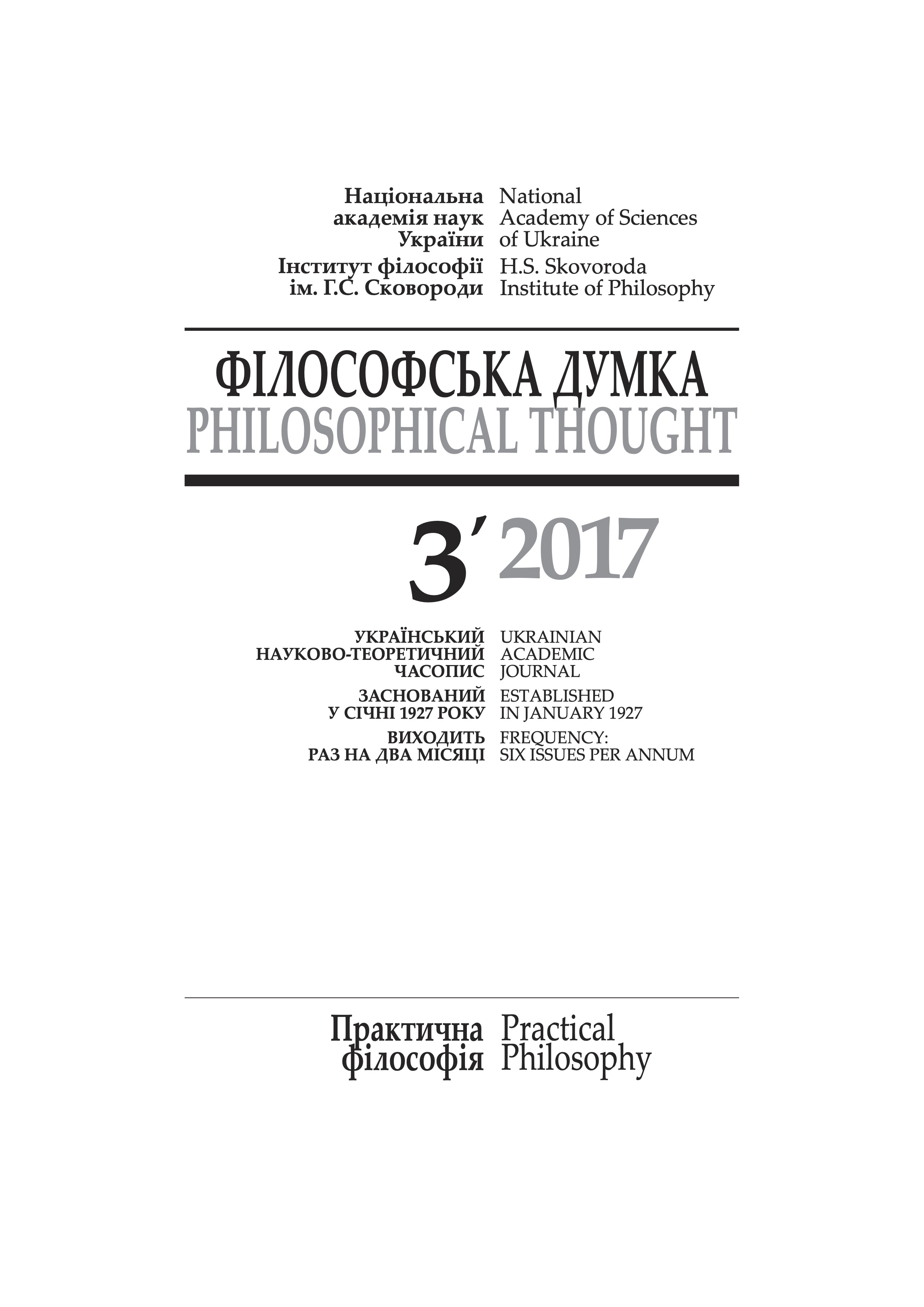«Аргумент зомбі» проти матеріалізму: основи та перспективи подальшого дослідження
Ключові слова:
арґумент зомбі, епіфеноменалізм, арґумент знання, інтуїтивна очевидність, аналітична феноменологія, континентальна феноменологія, Чалмерс, Декарт, ГусерльАнотація
У статті розглядається головний арґумент проти доктрини матеріалізму і серце сучасної психофізичної проблеми — арґумент зомбі. Головним пропонентом ідеї філософських зомбі є австралійський філософ Девід Чалмерс, чий головний опус «The Conscious Mind» повністю базується на ідеї збагненності та логічної можливості зомбі. Автор має намір показати, що для адекватного аналізу Чалмерсового арґументу зомбі самого тільки фрейму аналітичної філософії недостатньо, і у зв’язку з цим належить залучити Декартову філософію та феноменологію Е. Гусерля. Це пов’язано з тим, що автор розглядає Чалмерсів арґумент зомбі як інвертований картезіанський арґумент відокремленості ума від тіла, який має два рівні арґументації: інтуїтивна очевидність та логічна (conceivability — possibility фрейм). Чалмерсова апеляція до феноменальної свідомості, досвіду та інтуїції надає тверду основу для йменування його філософського проекту стосовно свідомості як аналітичної феноменології, а його самого як аналітичного феноменолога відповідно.
Посилання
Bogachov, A. (2011). Experience and sense. Monograph. [In Ukrainian] Kyiv: Dukh i litera [=Богачов 2011]
Translation as (mis)understanding. Terminological discussion (2015). In: Philosophical Thought (5, 68–93). [In Ukrainian] [= Переклад як (не)порозуміння 2015]
Chalmers, D. (1995). Facing up to the Problem of Consciousness. In: Journal of Consciousness Studies (2 (3), 200–219).
Chalmers, D. (1996). The Conscious Mind: In Search of a Fundamental Theory. New York: Oxford University Press.
Chalmers, D. (2002a). Consciousness and Its Place in Nature. In: Chalmers, D. (ed.). Philosophy of mind: classical and contemporary readings. Oxford, New York: Oxford University Press.
Chalmers, D. (2002b). Does Conceivability Entail Possibility? In: Gendler, T., Hawthorne, J. (eds.) Conceivability and possibility. Oxford: Oxford University Press.
Chalmers, D. (2004). Imagination, Indexicality, and Intensions. In: Philosophy and Phe no men olo gical Research (68, 1, 182—190).
Chalmers, D. (2010). The Two-Dimensional Argument Against Materialism. In: The Character of Consciousness (141–205). New York: Oxford University Press.
Chalmers, D. (2013). Facing Up to the Problem of Consciousness (tr. by A. Leonov). [In Ukrainian] In: Actual problems of Mind (14, 121—152). Kryvyi Rih. [= Чалмерс 2013]
Chalmers, D. (2015). Argument 1: The logical possibility of zombies. [In Ukrainian]. Philosophical Thought (5, 60–67). [= Чалмерс 2015]
Chalmers D. (2014). Intuitions in philosophy: a minimal defense. In: Philosophical Studies (171, 3, 535–544).
Crane, T. (2000). The Origins of Qualia. In: Crane, T., Patterson, S. (eds.). The History of Mind-Body Problem. London: Routledge.
Dennett, D.C. (1986). Content and consciousness, 2nd ed. Routledge & Kegan Paul Books Ltd.
Dennett, D.C. (2013). Intuition pumps and other tools for thinking. New York, W.W. Norton & Company, Inc.
Descartes, R. (1991). The Philosophical Writings of Descartes. Tr. by J. Cottingham, R. Stoothoff, D. Murgoch, A. Kenny. Cambridge: Cambridge University Press.
Descartes, R. (2000). Philosophical Essays and Correspondence. Ed., with Introduction, by R. Ariew. Hackett Publishing Company, Inc.
Descartes, R. (2014). Meditations on First Philosophy / Metaphysical Meditations. [In Ukrainian, Latin, and French]. In: Khoma, O. (ed.). Descartes’ «Meditations» in the Mirror of Modern Interpretations (115–292). [In Ukrainian] Kyiv: Duh i litera. [= Декарт 2014]
Frankish, K. (2007). The Anti-Zombie Argument. In: Philosophical Quarterly (57, 229).
Gallagher, S., Zahavi, D. (2008). The Phenomenological Mind. An Introduction to Philosophy of Mind and Cognitive Science. Routledge.
Husserl, E. (1911). Philosophy as Rigorous Science. Logos: International Philosophy of Culture Annual. Book One (1–56) (tr. by S. Gessen). [In Russian] [= Гуссерль 1911]
Jackson, F. (1982). Epiphenomenal Qualia. In: Philosophical Quarterly, 32.
Kebuladze, V. (2012). Phenomenology of experience. [In Ukrainian] Kyiv: Dukh i litera. [=Кебуладзе 2012]
Kirk, R. (2005). Zombies and Consciousness. New York. https://doi.org/10.1093/0199285489.001.0001
Leonov, A. (2014). David Chalmers’ Philosophy of Mind. In: Actual Problems of Mind (15, 216–237). [In Ukrainian] Kryvyi Rih. [= Леонов 2014]
Ludlow, Nagasawa, Stoljar (eds.) (2003). There’s Something About Mary. Cambridge, MA: MIT Press.
Minakov, M.A. (2007). History of a Notion of Experience. Monogragh. [In Ukrainian] Kyiv: PARAPAN. [= Мінаков 2007]
Smith, D.W. (2013). Phenomenology. In: Stanford Encyclopedia of Philosophy.
Stoljar, D., Nagasawa, Y. (2003). Introduction. In: Ludlow, Nagasawa, Stoljar (eds.). There’s Something About Mary (1—22). Cambridge, MA: MIT Press.
Zahavi, D. (2003). Husserl’s phenomenology. Stanford, California: Stanford University Press.
##submission.downloads##
-
PDF
Завантажень: 1109
Опубліковано
Як цитувати
Номер
Розділ
Ліцензія
Автори, які публікуються у цьому журналі, згодні з наступними умовами:
- Автори зберігають авторське право і надають журналу право першої публікації.
- Автори можуть укладати окремі, додаткові договірні угоди з неексклюзивного поширення опублікованої журналом версії статті (наприклад, розмістити її в інститутському репозиторії або опублікувати її в книзі), з визнанням її первісної публікації в цьому журналі.
- Авторам дозволяється і рекомендується розміщувати їхню роботу в Інтернеті (наприклад, в інституційних сховищах або на їхньому сайті) до і під час процесу подачі, так як це може привести до продуктивних обмінів, а також скорішого і ширшого цитування опублікованих робіт (див. вплив відкритого доступу).


